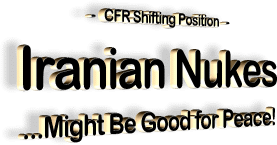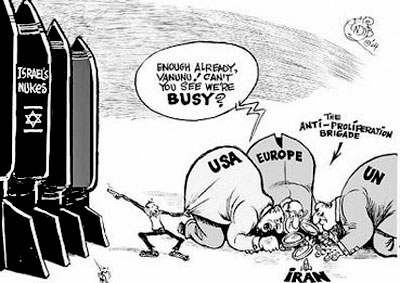
by R. W. Emerson II
June 19, 2012
from
ProjectNSearch Website

The Council on Foreign Relations (CFR),
representing the U.S. Establishment, is shifting its position on Iran.
The forthcoming issue of Foreign Affairs has
a cover article by Columbia University’s Kenneth Waltz called “Why Iran
Should Get the Bomb.”
Published by the Council on Foreign
Relations, the most important establishment think tank, Foreign Affairs
is the most influential foreign-policy periodical in print. Leading up
to the Iraq War, the journal published essays almost exclusively in
support of the invasion. Given its reach, Foreign Affairs’ one-sided
perspective on Iraq before 2003 must be counted as a significant
editorial failure.
By commissioning a piece by Waltz, however, the journal seems to be
trying to avoid making the same mistakes.
The journal has already published widely
discussed articles on both sides of the Iran issue, giving at least a
more balanced view than it did with Iraq. Waltz is among the most
influential international relations theorists in the world (tied for
second, according to one survey), but he rarely writes for anything but
academic journals.
His new essay, the feature in the
forthcoming issue, argues that the world would be better off if Iran
gets the bomb.
That argument may seem radical, but it is in
keeping with Waltz’s long-standing arguments on the stability of nuclear
weapons (arguments echoed by John Mearsheimer, among others).
- Jordan Michael Smith, "We can’t
crush Iran", Salon, 15 Jun 2012
Kenneth Waltz has now been allowed to
make his argument in favor of Iranian nukes in USA Today:
Israel's regional nuclear monopoly, which
has proved remarkably durable for more than four decades, has long
fueled instability in the Middle East. In no other region of the world
does a lone, unchecked nuclear state exist.
It is Israel's nuclear arsenal, not Iran's
desire for one, that has contributed most to the crisis. Power, after
all, begs to be balanced.
The danger of a nuclear Iran has been grossly exaggerated due to
fundamental misunderstandings of how states generally behave in the
international system.
One prominent concern is that the Iranian regime is inherently
irrational. Portraying Iran that way has allowed U.S. and Israeli
officials to argue that the logic of nuclear deterrence does not apply.
If Iran acquired a nuclear weapon, they warn, it would not hesitate to
launch a first strike against Israel, though it would risk an
overwhelming response destroying everything the Islamic Republic holds
dear.
Although it is impossible to be certain of Iranian intentions, it is far
more likely that if Iran desires nuclear weapons, it is for the purpose
of enhancing its own security, not to improve its offensive
capabilities.
Iran could be intransigent when negotiating
and defiant in the face of sanctions, but it still acts to secure its
own preservation.
- Kenneth Waltz, "Column: Iranian
nukes? No worries", USA Today, 17 Jun 2012
Iran has actually repudiated nuclear weapons and
has long supported the creation of a nuke-free zone in the Middle East. It
has addressed nuclear weapon concerns with
numerous conciliatory proposals,
most of which have been instantly dismissed by the Ziosphere.
Ahmadinejad has argued that nukes are useless:
If thousands did not save the Soviet Union
and if hundreds did not help Israel to crush Lebanon in 2006, then how
will one or two nukes help Iran?
Khamenei has issued a fatwa against nukes, and
calls their possession a sin against Islam. Our masked media have done a
very poor job of conveying this information to the American people.
Just the opposite, they have gone along with the
"Iranian Nuke" charade, just as they want along with the "Iraqi WMD" charade
in 2003.
What is so breathtaking is that the apparent
consensus on Iran, like the case against Iraq, is a fraud.
- "They Found Nothing. Nothing.’
// The IAEA, Iran And ‘Fantasy Land", Media Lens, 24 Nov 2011
Perhaps the Establishment fears that the Iranian
opposition to nuclear weapons would lead to Americans questioning the
U.S./Israeli infatuation with nukes. The new Kenneth Waltz approach allows
the Establishment to avoid a catastrophic conflict with Iran while
maintaining the legitimacy of its own nukes.
That aggression against Iran would indeed be
catastrophic is addressed by the Salon article, above.
The turning tide against a military strike
is underscored by three new reports on the problems of an attack.
Taken together, they suggest that
significant parts of the U.S. establishment are pushing back against the
notion that, in senior Romney adviser John Bolton’s words, “There is no
doubt that Washington could shatter Iran’s nuclear program,” and that
“Iran’s real options, post-attack,” would be “limited.”
First on the table is a monograph from the staunchly pro-Israel think
tank the Washington Institute on Near East Policy. The report is called
“Beyond Worst-Case Analysis,” suggesting that it intends to avoid what
it calls “apocalyptic” conclusions about an attack on Iran.
And yet, as former CIA analyst Paul Pillar
notes, the paper’s ideas suggest that the “consequences would be very
bad indeed”...
Following closely on the heels of the WINEP report is one from the
Center for a New American Security, famous for its support for
counterinsurgency campaigns.
The authors state definitively that a,
“preventive military strike against
Iran’s nuclear program by either the United States or Israel at this
time is not the best option, and rushing to war would risk making
the threat worse.”
- Jordan Michael Smith, "We can’t crush
Iran", Salon, 15 Jun 2012
These are not just words.
There is evidence that Obama has blocked an
Israeli strike that was to come from Azerbaijan,
Foreign Policy - a global magazine on
economics and politics - published on the same day that “Azerbaijan
granted Israel access to air bases on Iran border.”
Mark Perry reports there that a senior U.S.
administration official told him “The Israelis have bought an airfield,
and the airfield is called Azerbaijan.”
This is not new (see
Azerbaijan-Israel: A Shia - Jewish Alliance),
but the same sources added factual data. The Azeri military has four
abandoned, Soviet-era airfields that could be available to Israel, and
four air bases for their own aircraft.
One of them is close to Tehran.
“If Israeli jets want to land in
Azerbaijan after an attack, they’d probably be allowed to do so.
Israel is deeply embedded in Azerbaijan, and has been for the last
two decades,” the same source added.
The article goes on to explain that U.S.
officials believe Israel has been granted access to these air bases
through a “series of quiet political and military understandings.”
Again, this is not new, I described the
Israeli-Azeri alliance in detail; however, this now being official, has
slammed the door on Israel’s attack.
- A. True Ott, PhD., "War With
Iran Averted - At Least Until After the November Elections", 30 May 2012
See also NSearch: "Obama averts Israeli attack
on Iran"
Early signs of a change in U.S. Establishment thinking came back in January,
when the American Enterprise Institute, the primary neo-con think tank,
Suddenly the struggle to stop Iran is not
about saving Israel from nuclear annihilation.
After a decade of scare-mongering about the
second coming of Nazi Germany, the Iran hawks are admitting that they
have other reasons for wanting to take out Iran, and saving Israeli
lives may not be one of them.
Suddenly the neoconservatives have
discovered the concept of truth-telling, although, no doubt, the shift
will be ephemeral.
- MJ Rosenberg, "American
Enterprise Institute Admits The Problem With Iran Is Not" -
Political Correction, 02 Dec 2011
But the Netanyahu faction in Israel has not yet
gotten the message:
On the eve of the third round of talks
between Iran and the world powers expected to begin Monday in Moscow,
Israeli officials urged the international community to better impress
upon Tehran that they will face military action if their nuclear march
is not stopped...
In recent weeks differences between Israel and the US administration
over the world powers’ negotiating strategy with Iran have come out into
the open, with the group of nations negotiating with Iran known as the
P5+1 - the US, China, Russia, France, Britain and Germany - focused on
getting the Iranians to stop enriching uranium to 20 percent, while
Israel maintains Iran must stop all uranium enrichment at any level.
In addition to ending all uranium enrichment, Israel is also calling for
Iran to transfer all of the already enriched uranium in its possession
out of the country, and to close down the underground nuclear facility
at Qom.
- Herb Keinon, "Israel: Make
military threats against Iran more real", Jerusalem Post, 18 Jun 2012
Others in Israel, notably the Mossad chief,
Tamir Pardo, a former Mossad chief, Efraim Halevy, and a former
military chief of staff, Dan Halutz all oppose Israeli aggression
against Iran.
The former head of the Mossad, Meir Dagan,
has
called the planned attack on Iran,
"the stupidest thing I've ever heard".
However, the destruction of Iran has long been
an Israeli goal.
ISRAEL'S Prime Minister Ariel Sharon has
called on the international community to target Iran as soon as the
imminent conflict with Iraq is complete.
- "Attack Iran the day Iraq war
ends, demands Israel", Stephen Farrell, Robert Thomson and Danielle
Haas, London Sunday Times, 05 Nov 2002
So we Americans have been lied to yet again:
-
1964 - Gulf of Tonkin tale
-
1991 - Doctored satellite photos;
incubator story
-
1999 - Poor Kosovars
-
2001 - Official 9/11 Conspiracy Theory
-
2003 - Iraqi WMDs and false story about
Saddam-Atta Link
-
2011 - Protecting Poor Libyans
-
2012 - Protecting Poor Protesters in
Syria
-
2012 - Iranian Nukes
Ahmadinejad has been vindicated:
Why are you ruining the prestige of the [UN
nuclear] agency for absurd US claims? The Iranian nation is wise. It
won't build two bombs against 20,000 [nuclear] bombs you have.
But it builds something you can't respond
to: Ethics, decency, monotheism and justice.
- Ahmadinejad, speaking in the
central Iranian town of Shahr-e Kord, Nov 2011, quoted by Scott
Peterson, "Iran nuclear report: Why it may not be a game-changer after
all", Christian Science Monitor, 09 Nov 2011
Iran is ready to help creation of dialogue atmosphere between
governments and nations.
- Ahmadinejad
The era of military force is over, today is the era of nations, logic
and worshippers of God.
- Ahmadinejad

